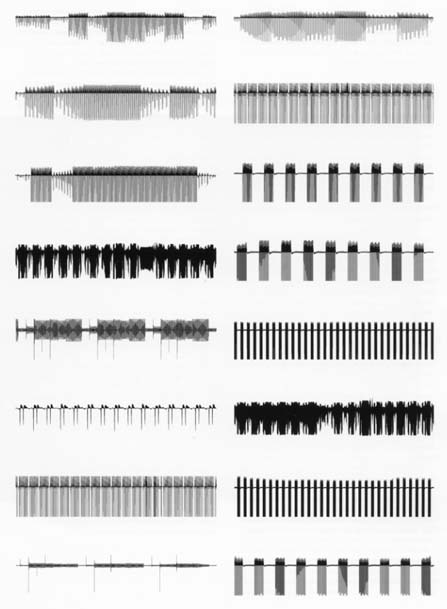For this project, Kubisch has employed "specially built headphones that receive electromagnetic signals from the environment," transforming those signals "into sound." In the process, "Kubisch maps a given territory, noting 'hot spots' (ATM machines, security systems, electronic cash registers, subway systems, etc.) where the signals are particularly strong or interesting." In other words, she performs a kind of audial psychogeography, zones of the city turned into MP3s, "very beautiful, very dense sounds... like a movie, an audio movie."
The images, below, represent the sound files those sounds produced, digital noise-maps of urban space.

Whether you're listening to the mellow, down-tempo techno of this light advertisement from Japan, or the sci-fi drone of a Taiwanese subway (which Cabinet covertly, and somewhat fascistically, editorializes as a region of China) -- or even the minimal, repetitive heartbeat of this security gate in Oxford, England, the mournful buzz of a Bratislava tram, which Kubisch describes as "almost like a choir," or the empty Ballardian hum of a control tower at Heathrow airport-- these are the electromagnetic sounds of modern urbanism.
"What I would really like to do," Kubisch says, "is to make a map of several cities and continents. In a large city, for example, where are the electromagnetic fields? Where are the security gates? You could just mark them with little dots. They even have the same sound systems all over the world. It's the globalization of sound. This is something that I think would be very interesting: to see a network of little dots showing where things are and where they are spreading. Every time I do an 'Electrical Walk,' it adds to this general map of sound that I'm collecting. It's artistic work, but it's a kind of social research, too."
There are thirty tracks in all. Knock yourself out.
(Related and elsewhere: we make money not art discusses Kubisch's project as well as "sound performances produced by people scanning their Oysters cards as they access London tube stations.")

